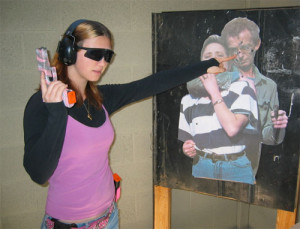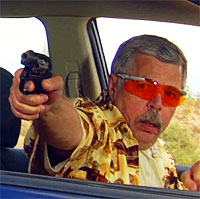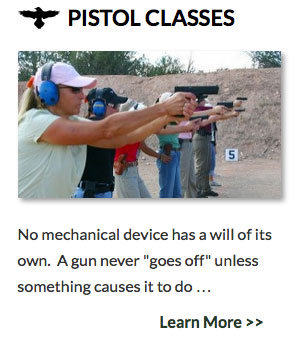Widgetized Section
Go to Admin » Appearance » Widgets » and move Gabfire Widget: Social into that MastheadOverlay zone
Going Against The Drop
Sergeant Manny Lopez and his team of San Diego Police officers weren’t crazy; they knew exactly what they were doing. Dressed as illegal aliens and trolling the lawless regions of the United States border they were hunting viscous border bandits while posing as prey. Each officer carried at least two handguns, some carried short barreled shotguns, and all had knives strapped to their persons. Manny liked small revolvers and habitually carried a five shot .38 snub-nose in each hand. Setting up in a likely area the team would sit on the ground and wait to be robbed, usually at gunpoint. Often, it was Manny himself who would start the festivities. When a bandit appeared, pointed a gun at him and demand money, Manny, with his arms crossed and those two revolvers concealed in his armpits, would say, “Sabes que?” (Do you know what?), and as the bandit started to reply, Manny would shout “BARF!”, produce both pistols and shoot until they were empty – as would everyone else on the team.
 When Joseph Wambaugh wrote Lines and Shadows, he tried to explain the behavior of Manny Lopez and his BARF team (Border Area Robbery Force) by describing them as adrenalin junkies and emotional casualties of their careers in law enforcement. How else to explain Manny’s obsession with going against the drop, Wambaugh asked? But the real truth of the matter was that Manny and his team weren’t taking unnecessary chances or foolishly risking their lives, but had learned to beat the drop.
When Joseph Wambaugh wrote Lines and Shadows, he tried to explain the behavior of Manny Lopez and his BARF team (Border Area Robbery Force) by describing them as adrenalin junkies and emotional casualties of their careers in law enforcement. How else to explain Manny’s obsession with going against the drop, Wambaugh asked? But the real truth of the matter was that Manny and his team weren’t taking unnecessary chances or foolishly risking their lives, but had learned to beat the drop.
The Drop
From its origins in Western gunfighter mythology, getting the drop on someone means pointing a gun at them before they are aware or have responded by pointing a gun at you. Conventional wisdom has it there is little you can do if being held at gunpoint. The assumption is that the person with the gun holds all the cards and is in a position to impose his will upon the person or persons staring down the barrel. In this country, an entire generation or two were raised to believe that compliance with the demands of the gunman and hoping to prevail upon his better nature were the only things to be done if someone got the drop on you. Store clerks were told to give up the cash, women were advised to submit to rape (after all, its better than dying – no doubt suggested by a man) and airline passengers were told not to resist if hijacked. Losing your money and your dignity or being forced to vacation in Cuba were seen as better alternatives than risking one’s life. Until September 11, 2001. Now people are fighting back.
Beating The Drop
Sergeant Lopez and his merry men didn’t need to wait for 9/11 to understand that evil must be resisted and they also understood if you’re going to go out and hunt evil you had better be prepared to meet it with overwhelming violence. So how do you beat someone who has the drop on you?
Whether border bandits, an armed robber or a home invasion burglary crew, the mindset is essentially the same: We have the weapons, we’re in charge, everyone will do what we tell them to, and we will get away with this. Therefore, our first step in beating the drop needs to be understanding this mindset and the next step involves short circuiting this thinking. Remember, the bad guy thinks he has all the power and expects to be obeyed. The script is running in his head just the way he had it planned.
Bad Guy: “Give me your money (snarling viciously) or I’ll blow your head off!”
Victim: “Hey, whatever you want, don’t hurt me.”
Bad Guy: “Give me your wallet!”
Victim: “Okay, I’m reaching for my wallet, don’t hurt me.”
Bad Guy: “Get a move on!”
Victim: “How ’bout those Yankees?”
Bad Guy: “What the ….”, followed by, BLAM, BLAM, BLAM!
What happened here? The Bad Guy made a demand and then had to wait to see if his victim was going to comply. The Victim set him up by getting permission to move and then changing the subject, thus short circuiting the BG’s mindset. When the BG spoke, the Victim did three things at the same time; he stepped to the side while drawing his pistol and firing. The Bad Guy went down with a surprised look on his face and without having had the chance to complete his sentence. The BARF team used the same psychology on the border bandits they encountered. When Manny yelled “BARF!” by the time the bandido said, “Mande?” (What?) everyone on the team was shooting.
Don’t Give Up Your Gun
When I entered law enforcement in the 1970s everyone in that line of work, and especially those in California were very familiar with two infamous events where law enforcement officers had been killed with their own weapons after giving up their guns. The first was made famous by another Joseph Wambaugh book and movie, The Onion Fields, and the other involved the murders of two Border Patrol Agents. I made up my mind I was never, under any circumstances, going to give up my gun. I decided if someone got the drop on me I was going to go for it with all the speed and violence I could produce.
On the surface this may sound foolish but there are some essential assumptions that can be brought to bear. First, action is faster than reaction. As stated earlier, beat them psychologically then move and shoot before they can decide to act. Second, if you’re carrying a pistol, either for a living, or in exercising your right of self defense, you should have trained and you should know that your pistol is as close to 100% reliable as is possible. If you have to go against the drop you are relying on your superior skills and weapons. Most bad guys are not well trained, many are impaired, and how do you know their weapon will even fire? Better to fight than to meekly hand over a functioning pistol. Submitting to evil is undignified and immoral. Good Guys fight back.
The Hostage Taker
One of the scenarios that comes up in the tactical simulators at Gunsite involves a hostage taker. After entering and working their way through the house the student is confronted by a target showing a hostage taker using a woman for a shield.
The dynamics of beating the hostage taker are similar to the armed robber, but with a few added elements. When confronting him, you are in the greatest danger because the BG has to get rid of you if he is to get away. He can’t shoot the hostage because he then loses his shield and bargaining power. As such, there are several things you need to do in order to be successful. One is to realize your danger and maximize the distance from the BG while remaining behind cover. Next, you must keep your head about you and stay as calm as possible while waiting to misdirect the BG’s thinking. Then, as he starts to speak, you must deliver a perfect shot to the central nervous system.
It might go something like this:

This young lady has successfully solved the hostage taker scenario in the Gunsite Funhouse.
Bad Guy: “Drop your gun!”
You: “No, you drop your gun and let her go.”
Bad Guy: “Drop your gun or I will shoot her!”
You: “What did you have for breakfast?”
Bad Guy: “What the….”, followed by, BLAM!
Summing Up
The actions I have described here are advanced gunfighting skills and should not be attempted by those who have not experienced high quality fighting based firearms training. Having said that, you can prepare yourself by understanding the way these things play out, mentally preparing yourself and practicing your shooting skills. Then, if Evil comes knocking at the door, and I sincerely hope it doesn’t, you will know what to do.
About the Author:
 Ed Head is a regular on Shooting Gallery and Down Range TV. He has worked for almost 30 years in law enforcement, first in the United States Air Force and then with the United States Border Patrol, retiring as a Field Operations Supervisor. During his Border Patrol career, Ed worked in a variety of patrol, investigative and training capacities. Ed has an extensive background as a firearms instructor, having trained thousands, ranging from beginners to police, military and special operations personnel. Having taught at Gunsite for 20 years, Ed first trained there under the world famous shooting school’s founder, Jeff Cooper, then later ran the school as the operations manager for more than five years. Ed lives in Chino Valley, Arizona, where he continues to teach and write.
Ed Head is a regular on Shooting Gallery and Down Range TV. He has worked for almost 30 years in law enforcement, first in the United States Air Force and then with the United States Border Patrol, retiring as a Field Operations Supervisor. During his Border Patrol career, Ed worked in a variety of patrol, investigative and training capacities. Ed has an extensive background as a firearms instructor, having trained thousands, ranging from beginners to police, military and special operations personnel. Having taught at Gunsite for 20 years, Ed first trained there under the world famous shooting school’s founder, Jeff Cooper, then later ran the school as the operations manager for more than five years. Ed lives in Chino Valley, Arizona, where he continues to teach and write.



 MidwayUSA
MidwayUSA Ruger Firearms
Ruger Firearms SCCY Firearms
SCCY Firearms Streamlight
Streamlight Action Targets
Action Targets Gunsite Academy
Gunsite Academy
4 Responses to Going Against The Drop
You must be logged in to post a comment Login